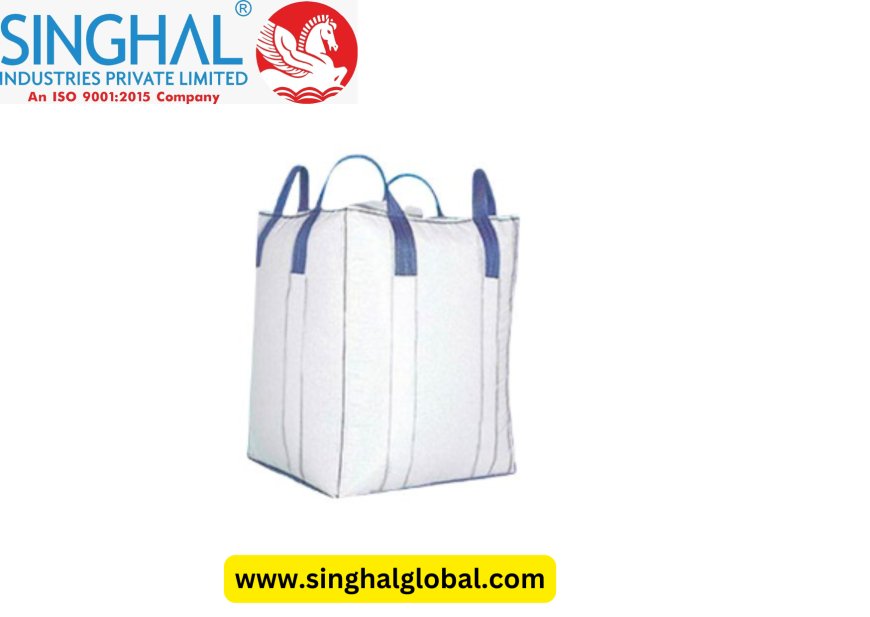The Essential Guide to Jumbo Bags: Price, Uses, and Benefits

In today’s fast-paced world, packaging solutions play a critical role in various industries, from agriculture to construction. Among the various options available, Jumbo bag plastic (also known as FIBC or Flexible Intermediate Bulk Containers) stand out due to their versatility, strength, and capacity. This guide delves into the benefits, pricing, and diverse uses of jumbo bags, providing valuable insights for businesses and consumers alike.
Understanding Jumbo plastic Bag
Jumbo plastic bag are large, flexible bags made from woven polypropylene (PP) material. Designed to hold substantial volumes of bulk materials, these bags can typically carry between 500 kg to 2000 kg, depending on the specifications. They come in various shapes and sizes, making them suitable for different applications. The robust construction ensures that they can withstand significant weight and environmental stress, making them ideal for both storage and transportation.
Advantages of Using Jumbo Bags
One of the primary reasons for the popularity of jumbo bags is their durability. Made from high-density polypropylene, these bags are resistant to tearing, puncturing, and UV exposure. This durability ensures that the contents remain protected, whether they are being transported over long distances or stored in a warehouse. Additionally, their lightweight design allows for easy handling, reducing labor costs and enhancing operational efficiency.
Moreover, jumbo bags are designed for reuse. Many bags can be used multiple times, making them a sustainable packaging option. This not only lowers material costs for businesses but also contributes to a greener environment by reducing plastic waste.
Jumbo Bag Prices
When considering Jumbo bag price, it’s essential to understand that the cost can vary based on several factors, including size, capacity, design, and the manufacturer. On average, the price for a standard jumbo bag ranges from $5 to $15 per unit. Custom designs, such as those featuring additional features like liners or specialized closures, may incur higher costs.
Bulk purchases often result in discounts, making it economically beneficial for businesses that require large quantities. It’s advisable to compare prices from different suppliers and inquire about potential bulk discounts to ensure you get the best deal.
Diverse Uses of Jumbo Bags
The versatility of jumbo bags makes them suitable for various applications across multiple industries. Here are some common uses:
1. Agriculture
Jumbo bags are widely used in agriculture for storing and transporting grains, seeds, fertilizers, and other bulk materials. Their ability to hold significant weights makes them ideal for farmers looking for efficient storage solutions.
2. Construction
In the construction industry, jumbo bags are employed for transporting sand, gravel, and other heavy materials. Their durability ensures they can withstand the rigors of construction sites, while their flexible design allows for easy stacking and storage.
3. Chemicals
The chemical industry often uses jumbo bags for the safe storage and transport of powdered and granulated substances. Their resistance to chemical reactions makes them suitable for a variety of applications, ensuring that materials remain secure and uncontaminated.
4. Food Industry
In the food industry, jumbo bags are used to store bulk quantities of ingredients such as sugar, flour, and rice. These bags can be designed with food-grade materials to ensure safety and compliance with health regulations.
5. Recycling
Jumbo bags are also used in recycling processes to hold and transport recyclable materials. Their large capacity allows for the efficient collection of various recyclables, supporting sustainability efforts in waste management.
Tips for Choosing the Right Jumbo Bag
When selecting jumbo bags for your specific needs, consider the following factors:
-
Capacity: Determine the weight and volume of the materials you need to store or transport. This will help you choose the appropriate bag size.
-
Material Quality: Look for bags made from high-quality polypropylene that offers strength and durability.
-
Design Features: Depending on your requirements, consider features like liner options, filling spouts, and discharge outlets that enhance usability.
-
Supplier Reputation: Choose a reputable supplier known for quality products and customer service. Checking reviews and testimonials can provide insights into their reliability.
Conclusion
Jumbo bags represent a cost-effective and versatile packaging solution that caters to a wide range of industries. Their durability, capacity, and reusability make them an excellent choice for businesses looking to optimize their storage and transportation processes. By understanding the pricing, uses, and benefits of jumbo bags, you can make informed decisions that enhance your operational efficiency.
Here are Related For Jumbo bag plastic
Q1: What materials are jumbo bags made from?
Ans: Jumbo bags are primarily made from woven polypropylene, which offers excellent strength and durability. This material is resistant to tearing, puncturing, and UV exposure, making it suitable for various applications.
Q2: Can jumbo bags be reused?
Ans: Yes, many jumbo bags are designed for reuse. Their sturdy construction allows them to be used multiple times, making them a sustainable and cost-effective packaging option for businesses.
Q3: How do I choose the right jumbo bag for my needs?
Ans: To select the appropriate jumbo bag, consider factors such as capacity, material quality, design features, and the reputation of the supplier. Assess the weight and volume of the materials you plan to store or transport to determine the best bag size.
What's Your Reaction?
















